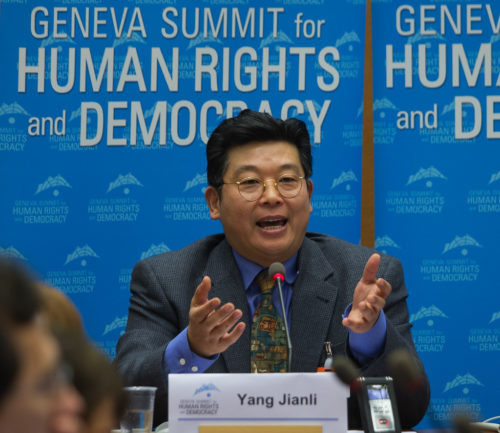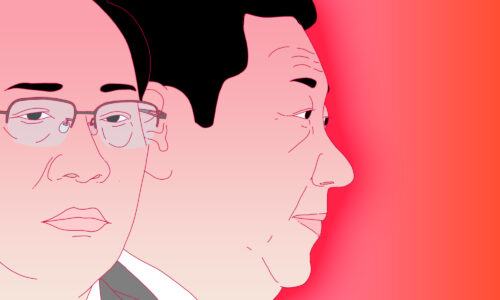Ghosts of Communists past
Litmus tests for U.S. citizenship based on Communist Party membership are a throwback to the 1950s. They still don't make sense.

When Yáng Jiànlì 杨建利, a prominent Chinese human rights activist, applied to become a U.S. citizen in 2020 after years of living in exile, his case was denied. Why? In some ways, Yang was the perfect candidate for naturalization, as he was a fierce China critic who had lived in the U.S. off and on for about three decades. But the problem: he was once a member of the Chinese Communist Party (CCP).
Before leaving China in 1986 for Berkeley, the Shandong-born academic was in a master’s program at Beijing Normal University. There, he joined the CCP in 1983, following Hú Yàobāng’s 胡耀邦 campaign to absorb young intellectuals into the organization.
During the visa application process, Yang was asked if he was a member of a communist party, to which he answered no. “The answer was obviously dishonest,” Yang said in a blog post written last October 4. Yang said he was advised by Chinese foreign affairs agencies not to disclose his party membership, or he would not get a visa.
Three years after Yang arrived in California, in 1989, protests broke out in Tiananmen. Yang was among the many Chinese intellectuals in America — including Liú Xiǎobō 刘晓波, then a visiting scholar in the United States — who returned to the People’s Republic to support the movement. Yang fled China before the arrests began; it was because of his involvement at Tiananmen, according to his own account, that made his alma mater revoke his CCP membership. Yang sought political asylum in the U.S., where he became a permanent resident and a vocal critic of the Chinese government; he also completed two PhDs, one in mathematics from Berkeley and the other in political economy from Harvard.
The Chinese citizen returned to China — illegally — in 2002, using a friend’s passport. At that time, his applications for a Chinese passport had been denied four times by the Chinese ministry of foreign affairs, because he had been on a government blacklist. He served five years in prison on charges of espionage and illegal entry. Beijing, under pressure from the U.S. government, eventually released Yang, allowing him to return to America in 2007.
The Chinese activist said he had never applied for U.S. citizenship over the past three decades. “When I was twice present at the UN Human Rights Council questioning — and appealing against — the Chinese government’s human rights record, I first declared, ‘I, Yang Jianli, am a Chinese citizen.’” He recently decided to naturalize, however, citing the difficulty of international travel (and entering certain UN buildings) without a proper passport.
His naturalization process went smoothly — according to Yang — until he decided to acknowledge his past CCP membership. “It was never my intent to deceive the U.S. government,” he said to his U.S. Citizenship and Immigration Services officer. “In the United States, I have never shied away from talking about that part of my history in any of my public speeches and articles on any occasion.” This was true: He had been open about his previous membership. Yang’s case was nevertheless denied.

The Immigration and Nationality Act of 1952, also known as the McCarran–Walter Act, came into effect amid the Cold War during the height of McCarthyism.
For the first time in U.S. history, a law prohibited all non-citizens — immigrants or otherwise — who are members of or affiliated to a communist party from stepping on U.S soil. It granted waivers to those who became members out of necessity, or those who had left the party for five years, “actively opposed to the doctrine, program, principles, and ideology” within that time frame.
This became the legal basis for Yang’s requirement to disclose his party affiliation in 1986 when he moved to the U.S. to study at Berkeley. Shortly after his arrival, the Immigration Act of 1990 amended the previous statute, exempting non-immigrants — including temporary visitors, workers, and students — from the communist membership test.
Around this time, some card-carrying Chinese communists did become permanent residents, and some eventually naturalized. Following the 1989 protests in China, the Chinese Student Protection Act of 1992 gave green cards to more than 50,000 PRC nationals — among them China’s best young intellectuals, many of whom had likely been recruited by the CCP before expatriation. Immigrants under the CSPA became the first PRC-born academics, scientists, and entrepreneurs in the U.S.
During the next few decades, an unprecedented number of Chinese from the mainland moved to America. The population of Chinese students in U.S. universities rose from almost zero in the 1970s to some 370,000 today. The number of U.S. non-immigrant visas granted in China increased significantly as well, no questions asked about communism, thanks to the 1990 bill.
Donald Trump’s recent moves have seemingly turned back the clock — to 1952. Recent Chinese immigrants to the U.S. have been subject to increasingly stringent scrutiny amid fraught relations between the U.S. and China. In October, U.S. Citizenship and Immigration Services issued a policy alert that cited content from the 1952 bill: “Unless otherwise exempt, any immigrant who is or has been a member of or affiliated with the Communist or any other totalitarian party, domestic or foreign, is inadmissible to the United States.”
Though the alert was more of a reiteration of existing laws, the message was in line with other Trump policies. In July, the Trump administration reportedly considered a blanket travel ban on CCP members and their immediate family members. While a comprehensive ban was never implemented, the White House tightened up visa restrictions on the same group, granting them single-entry tourist visas only. (U.S. temporary visitor visas for Chinese nationals are usually valid for 10 years, good for multiple entries — a legacy from the Obama years.) The actual effects of the rule, however, have yet to be seen — U.S. visa applications have been suspended in China due to COVID-19, and few Chinese tourists are visiting America at this moment.
But Trump’s actions are counterproductive. CCP membership is hardly indicative of one’s political opinions, let alone any direct involvement with the party’s decision-making apparatus. There are more than 90 million card-carrying Communists living in China — Trump’s policy would have affected their immediate family members as well, so we’re talking about more than 200 million people — but few among them work for the state, and even fewer have a say on policies.
It was common for Chinese nationals to join the party in their college years, especially back in an era when party membership paved the way for a good career. It is also not easy to quit the party, as Tony Lin has reported. Among those who have paid their membership dues, many — like Dr. Lǐ Wénliàng 李文亮, the late ophthalmologist penalized for raising the alarm about the coronavirus outbreak, or this Uyghur intellectual detained due to accusations of separatism — do not benefit from its policies. There is Jack Ma, the unabashed capitalist behind Alibaba. Some, like Yang, are dissidents. But most card-carrying members are simply ordinary people with differing, sometimes contradictory views of the CCP.
As Tanner Greer, who is usually hawkish on China, has argued: “The average man on the Chinese street will not view [Trump’s policy] as an attack on the Party, but an attack on the Chinese people. How could they think otherwise, when one out of six Chinese is being targeted? Instead of dividing the people from the Party we would instead be rallying them around the Party flag.”
One hears the argument often: “Hate the Chinese Communist Party; love the Chinese people.” This almost seems like a truism for those who object to the CCP’s actions and ideologies. In reality, however, it is a tightrope to walk on when there is a blurred line — and a complex relationship that cannot be defined in binary terms — between the two.

After filing an appeal, Yang Jianli announced on January 11 that he reached an out-of-court settlement with prosecutors. The Chinese activist will get to keep his permanent residency and be eligible for U.S. citizenship in another four years, he said.
Yang’s story may have a happy ending, but Trump’s visa restrictions on CCP members and their families may affect a large portion of the Chinese populace yet. More work needs to be done to mitigate the damage.
Ethnic Chinese scientists and academics now face increased scrutiny regarding their links to Chinese institutions and government entities. While legal probes may be justified in some cases, others hinge on racial profiling, as the broader trends evoke the memories of Cold War-era McCarthyism — a time when Chinese-born talents, such as the Caltech physicist Hsue-Shen Tsien 钱学森 (Qián Xuésēn), along with their peers of other nationalities, were persecuted due to their political leftism.
The lesson here, perhaps, is to recognize the layered complexities and deep contradictions in the politics of Chinese individuals rather than inciting lazy Sinophobia and loyalty tests. Joe Biden can — and should — overturn Trump’s visa restrictions, part of a more general toning down of Trump’s xenophobic, confrontational tactics. It would be one of his administration’s easiest moves.






